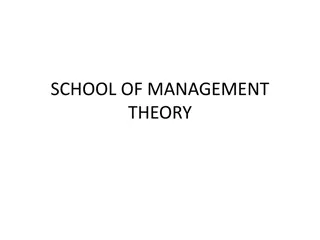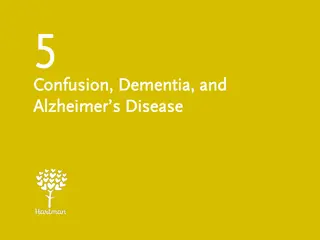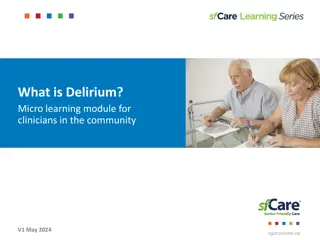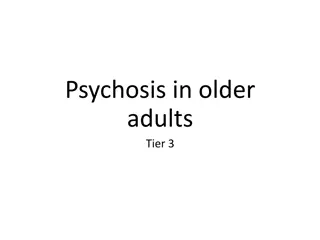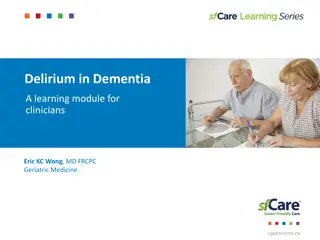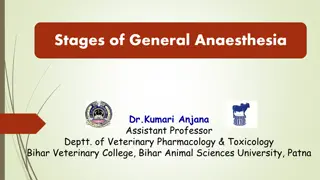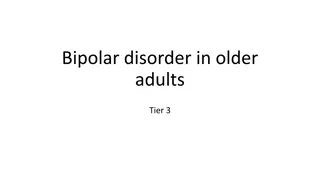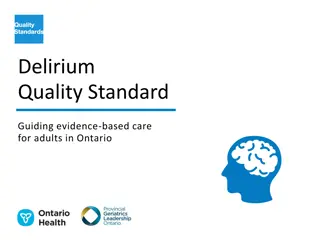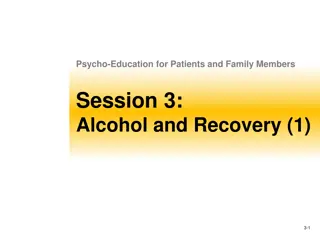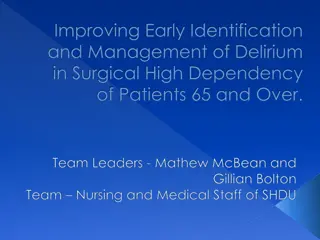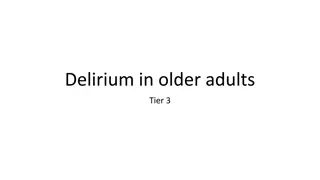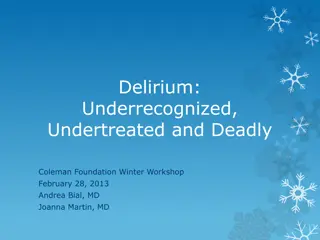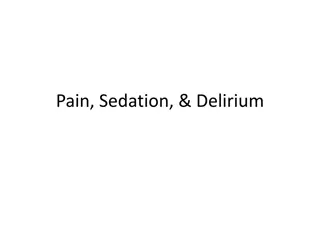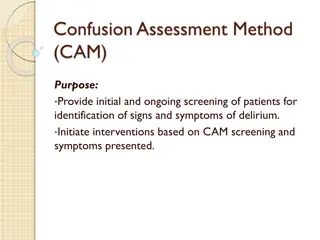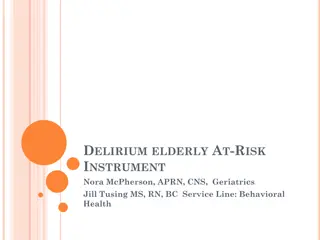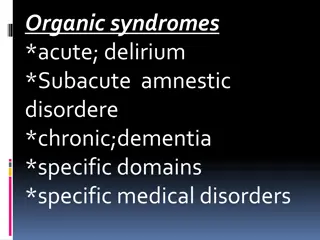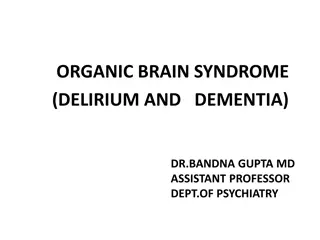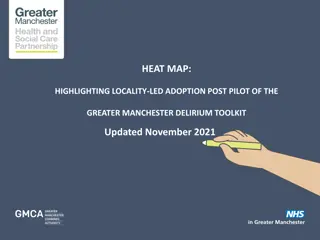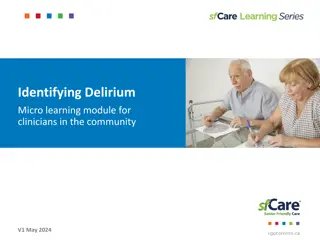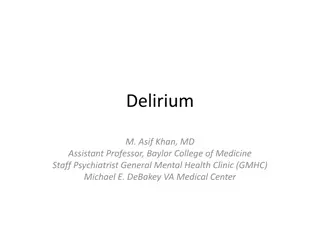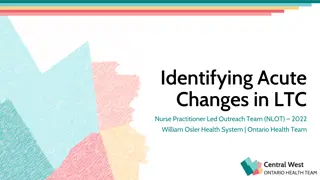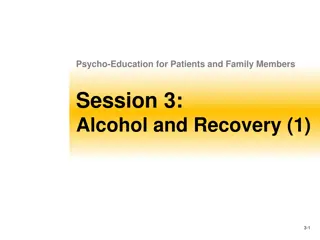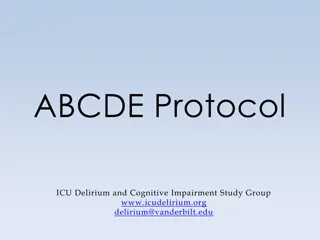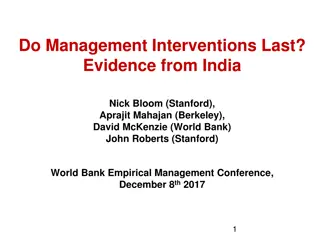Understanding Management, Leadership, and Organizational Success
The process of achieving organizational objectives through effective management and leadership is crucial for success. Management roles, such as top management, middle management, and supervisory management, each play a distinct role in implementing strategic plans and motivating employees. Skills l
9 views • 26 slides
FACILITY MANAGEMENT & SAFETY
Facility management and safety are interlinked disciplines crucial for optimizing workflow and ensuring a safe environment in various facilities. This includes managing space, infrastructure, resources, and staff effectively. Specific focus on laboratory facility management involves maintaining qual
3 views • 19 slides
Comprehensive ICU Protocol for Sedation, Analgesia, and Delirium Control by Dr. Vinod Srivastava
This comprehensive ICU protocol by Dr. Vinod Srivastava, an Associate Professor in Anaesthesiology & Critical Care at KGMU, covers key aspects such as sedation, analgesia, delirium assessment and control, stress ulcer and deep vein thrombosis prophylaxis, and glycaemic control in the ICU setting. Th
1 views • 50 slides
adonai software
Adonai college Management System is a cloud-based ERP System that delivers various College and School Management Systems, College and School Management Software, College and School Management System ERP, College and School Management Software System, Online College and School Management Software Sys
3 views • 1 slides
Strategic Infrastructure Asset Management Plan (SIAMP) Overview
Strategic Infrastructure Asset Management Plan (SIAMP) Module 6 focuses on portfolio management principles for effective infrastructure asset management. Portfolio managers are guided on planning, managing work portfolios, and collaborating with other delivery management modules. The SIAMP outlines
6 views • 32 slides
National Radioactive Waste Management Plan Overview
Briefing the Select Committee on Land Reform, Environment, Mineral Resources, and Energy about the South African Radioactive Waste Management Programme and the legislative background governing radioactive waste management. The presentation outlines the framework, guiding elements, waste management p
4 views • 19 slides
Evolution of Management Theories: Classical Approach and Scientific Management
Explore the evolution of management theories focusing on the Classical Approach and Scientific Management. The Classical Approach emphasizes efficiency and specialization, while Scientific Management introduced systematic methods to increase productivity. Learn about key figures like Frederick Winsl
6 views • 31 slides
Comprehensive Property Management Services in Waterbury, CT by Idoni Management
Explore the comprehensive property management services offered by Idoni Management in Waterbury, CT. Our expert team provides tailored solutions for property owners, including tenant screening, rent collection, property maintenance, financial reporting, and lease management. Discover why we are the
1 views • 10 slides
Understanding Confusion, Dementia, and Delirium in Healthcare
This content discusses confusion, dementia, and delirium in relation to Alzheimer's disease, covering definitions, causes, and caregiving tips. Confusion is the inability to think logically, while delirium is a sudden state of severe confusion. Causes include infections, medications, and lack of sle
0 views • 53 slides
Understanding Delirium: A Micro Learning Module for Clinicians
Delirium is a sudden change in an individual's memory, thinking, and behavior, which requires urgent medical attention. Often misdiagnosed, it can be mistaken for other conditions like depression or dementia. Knowing the signs and symptoms, such as fluctuating confusion, difficulty focusing, and cha
1 views • 9 slides
Introduction to Organizational Behavior: Management Theories and Practices
Explore the evolution of organizational behavior from early management theories to contemporary practices. Understand the historical foundations and relevance of management theory in shaping workplace dynamics. Delve into key concepts like Scientific Management, Administrative Management, Bureaucrat
1 views • 28 slides
Understanding Psychosis in Older Adults
Psychosis in older adults presents unique challenges due to varied etiology, different presentations, and higher associated morbidity. Causes include medical conditions, psychiatric disorders, and certain medications. Delirium, depression, and dementia are common contributors to psychosis in the eld
0 views • 12 slides
Understanding Psychosis in Older Adults
Psychosis in older adults involves a loss of contact with reality, including hallucinations and delusions. Symptoms vary but can include disordered thoughts, behaviors, and negative symptoms. It is common in older adults and can have various causes, such as delirium, mood disorders, dementia, and su
0 views • 10 slides
Understanding Delirium in Dementia for Clinicians
This learning module provides clinicians with insights into the relationship between delirium and dementia, how to distinguish between the two conditions, practical approaches to assessing delirium in dementia patients, treatment implications, and a structured method for delirium detection using cas
0 views • 29 slides
Understanding the Stages of General Anaesthesia in Veterinary Practice
Explore the four stages of general anaesthesia in animals, from the excitement and analgesia phase to delirium, surgical anaesthesia, and medullary paralysis. Learn about the criteria used to describe depth of anaesthesia and the specific characteristics of each stage. Dive into the complexities of
0 views • 14 slides
Understanding Bipolar Disorder in Older Adults
Bipolar disorder in older adults can have a later onset, often after the age of 50, with episodes of mania and depression. Recognizing symptoms like excessive energy, inability to sleep, and cognitive impairment is crucial. Late-onset bipolar disorder differs from early-onset in familial illness rat
1 views • 12 slides
Delirium Quality Standard in Ontario: Improving Evidence-Based Care
Delirium quality standards in Ontario aim to guide evidence-based care for adults by addressing gaps and variations in care quality. These standards inform clinicians, patients, and organizations on what quality care looks like, incorporating the best available evidence to ensure consistent, high-qu
0 views • 39 slides
Waste Management Priorities in Solomon Islands
The presentation by Debra Kereseka at the PACWASTEPLUS Steering Committee Meeting highlighted key waste management priorities in the Solomon Islands. Topics covered include the management of different waste streams, challenges faced, and clarifications for the project management unit. Priorities inc
0 views • 7 slides
Understanding Alcohol's Impact on the Body and Recovery Process
Alcohol disrupts brain chemical balance, leading to dependence, withdrawal symptoms, and potential life-threatening conditions like delirium tremens. Long-term alcohol consumption can severely damage various body systems. This session provides insights on the effects of alcohol on physical and menta
0 views • 18 slides
Enhancing Delirium Management in Surgical High Dependency Patients 65 and Over
Improving early identification and management of delirium in surgical high dependency unit (SHDU) patients aged 65 and over led by Mathew McBean and Gillian Bolton. Data collection, education initiatives, and pharmacological management guidelines were implemented, resulting in increased staff confid
0 views • 5 slides
Understanding Delirium in Older Adults: Types, Causes, and Symptoms
Delirium in older adults is a complex syndrome characterized by disturbances in consciousness, attention, perception, thinking, memory, and behavior. It commonly presents as hyperactive, hypoactive, or mixed types and can be caused by various factors such as medication, infections, metabolic imbalan
0 views • 17 slides
Understanding Delirium and Dementia: Key Differences and Recognition
Delirium and dementia are distinct conditions with specific diagnostic criteria. Delirium involves acute changes in attention and cognition, often due to underlying medical issues. Differentiating delirium from dementia and mild cognitive impairment is crucial. Recognizing delirium's rapid onset, fl
0 views • 34 slides
Delirium: Underrecognized, Undertreated, and Deadly Workshop Insights
Delirium is a serious condition frequently seen in advanced illness and palliative care settings. It is often underrecognized and undertreated, leading to detrimental outcomes such as increased mortality and healthcare costs. Understanding the symptoms, prevalence, outcomes, and impact of delirium i
0 views • 54 slides
Pain, Sedation, & Delirium Management in Critical Care
Effective management of pain, sedation, and delirium is essential in critical care settings to optimize patient comfort, facilitate recovery, and ensure better outcomes. The goal is to control pain adequately, minimize sedative use, and address indications for analgesia and sedatives while being min
0 views • 23 slides
Comprehensive Overview of Confusion Assessment Method (CAM) for Delirium Screening
Confusion Assessment Method (CAM) is a crucial tool used for screening delirium in patients, particularly those aged 65 and older or presenting with acute confusion. CAM assesses for clinical features like acute onset, fluctuating course, inattention, disorganized thinking, and altered level of cons
0 views • 15 slides
Risk Management & MPTF Portfolio Analysis at Programme Level for UN Somalia
This session delves into the world of risk management and portfolio analysis at the programme/project level, specifically focusing on the Risk Management Unit of the United Nations Somalia. It covers enterprise risk management standards, planned risk management actions, the role of RMU, joint risk m
0 views • 30 slides
Delirium Risk Assessment Tool for Elderly Patients
Assessing the risk of post-operative delirium in elderly patients is crucial for improving outcomes and reducing complications. The Delirium Elderly At-Risk (DEAR) instrument is a valuable tool that evaluates multiple domains including age, sensory impairment, functional dependence, substance use, a
0 views • 23 slides
Understanding Organic Syndromes: Delirium, Subacute Amnestic Disorder, and Chronic Dementia
Explore the spectrum of organic syndromes including delirium, subacute amnestic disorder, and chronic dementia. Delve into the definitions, statistics, causes, management strategies, classifications, and reversible dementias associated with these conditions.
0 views • 13 slides
Understanding Cognitive Disorders in Psychiatry: A Comprehensive Overview
Cognitive disorders disrupt higher brain functions, impacting memory, attention, and decision-making abilities. This article explores the classification of cognitive disorders, focusing on delirium, a common syndrome characterized by consciousness disturbance and cognitive changes. Delirium predomin
0 views • 26 slides
Manuherikia Catchment Management Plan Overview
An overview of the Manuherikia Catchment Plan presented to the Manuherikia Reference Group, emphasizing a holistic and values-based approach to flow management. The plan includes a flow management proposal with three management zones and a four-tiered approach for each zone. Site management tiers an
0 views • 14 slides
Understanding Organic Brain Syndrome & Delirium
Overview of organic brain syndrome and delirium, including definitions, clinical features, and management. Delirium, a common psychiatric syndrome, affects consciousness, cognition, and perception, leading to increased morbidity and mortality. Recognize core symptoms, such as disturbances in conscio
0 views • 37 slides
Island-Based Fisheries Management in the U.S. Caribbean Region
The management of fisheries in the U.S. Caribbean region is undergoing a shift towards island-based management rather than species-based. This transition involves steps such as developing environmental assessments, initiating NEPA processes, and drafting new island-based Fishery Management Plans (FM
0 views • 7 slides
Locality-Led Adoption Post Pilot of the Greater Manchester Delirium Toolkit
Highlighting the successful pilot of the Greater Manchester Community Delirium Toolkit led by local teams in various regions. The toolkit aimed to standardize screening, assessment, and management of delirium, resulting in improved quality of care, proactive follow-up, timely treatment, education fo
0 views • 17 slides
Understanding Delirium: Differentiating It from Dementia in Community Clinics
Learn how to differentiate delirium from dementia in community clinic settings with this micro-learning module. Delirium is often misdiagnosed but has key features such as sudden changes in cognition, fluctuating symptoms, and altered alertness levels. Discover practical assessment approaches and ca
0 views • 7 slides
Understanding Network Management Processes in Computer Networks
Network management processes play a vital role in maintaining the efficiency and security of computer networks. This includes fault management, configuration management, accounting management, performance management, and security management. Syslog, a standard for computer message logging, is utiliz
0 views • 78 slides
Understanding Delirium: Diagnosis, Management, and Implications
Delirium, a common yet often misdiagnosed condition, is a disturbance of consciousness with acute onset and fluctuating symptoms. Learn about its impact, diagnostic criteria, and management strategies in clinical settings to improve patient outcomes.
0 views • 37 slides
Enhancing Care for Long-Term Care Residents Through Early Detection and Intervention
This collection of resources highlights the importance of identifying acute changes in long-term care (LTC) residents, focusing on potentially preventable conditions such as chronic obstructive pulmonary disease, urinary tract infections, pneumonia, and heart failure. It underscores the risks associ
0 views • 25 slides
Understanding the Effects of Alcohol on the Body: Psycho-Education Session
Alcohol consumption disrupts the delicate balance of chemical systems in the brain and body, leading to a range of effects from euphoria and lowered inhibitions to long-term damage to vital organs. The session covers alcohol's impact on the brain, withdrawal symptoms, risks of delirium tremens, inci
0 views • 18 slides
ABCDE Protocol and MIND-USA: Enhancing Critical Care Practices
Explore the importance of the ABCDE Protocol in managing ICU patients, focusing on sedation, analgesia, and the prevention of delirium. Learn about the potential drawbacks of sedative therapies and the need for coordinated care in critical care settings. Discover the MIND-USA ABCDE Protocol, emphasi
0 views • 43 slides
Management Interventions' Long-Term Impact in Indian Firms
This study examines the lasting effects of management interventions in Indian textile firms over an 8-year period, revealing that while some improvements were reversed, treatment remained significant for management and performance. Factors like managerial turnover influenced the persistence of these
0 views • 38 slides






